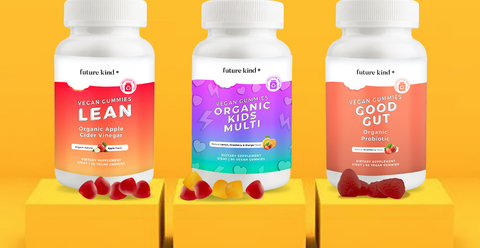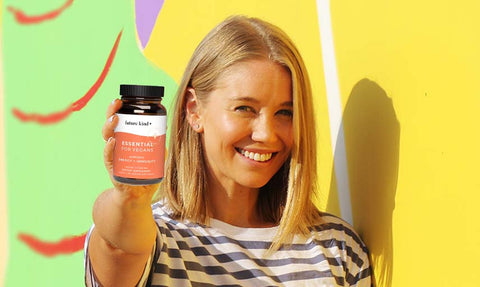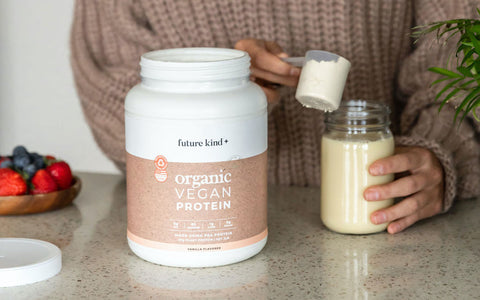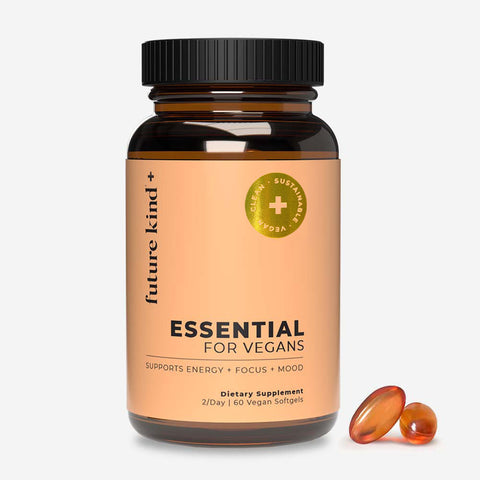Looking for the best vegan multivitamin?
You might already think that a premium-quality vegan daily multivitamin with a lot of different nutrients and minerals is the easiest, most convenient way of getting your daily recommended vitamins and minerals. But do you really know what should be in it?
Why Is the Best Vegan Multivitamin Future Kind?
Ok, we're obviously biased, but here's why we think our essential vegan multivitamin is the best choice 99% of the time (don't worry we'll also review the competition fairly later in this article in case you're one of the 1% where it might be a better fit).
Unlike most multivitamins that contain tons of ingredients you don't actually need, we are laser focused on only providing the key things science and leading vegan doctors (like Dr Greger) recommend as required for a balanced vegan diet in 2020: Omega 3, B12 and D3.
Pros
- 400+ amazing reviews since 2018 for better energy, skin, digestion and more.
- 3 key nutrients - at the proper full dosages.
- Easy to swallow in in 2 tiny capsules per day.
- Every batch is 3rd party tested (results always available on request).
- Sweet orange citrus scent hides any fishy algal omega 3 scent.
- 100% sustainable packaging and carbon offsetting.
- Non GMO
- Vegan society registered.
Cons
- It can't cover all gaps in a bad diet (but our team can help get you on the right path).
- More expensive than some other options (that don't contain the correct full dosage amounts).
Are b12, Omega 3 and d3 Really Enough in a Vegan Multivitamin?
Don't take our word for it. See what Registered Dietician Nutritionist Whitney English R.D has to say about it (and Future Kind):
Let’s be very clear: the majority of your daily vitamins and minerals should come from a balanced, health-promoting plant-based diet focused on whole foods and not from vegan multivitamins. Call us crazy as a supplement company, but we believe in as minimal supplementation as possible.
Many common deficiencies can be easily avoided by including plenty of green leafy vegetables, fresh fruits, nuts, and seeds in your daily diet. That is why planning out your meal plan is crucial, no matter how long you’ve been vegan or if you're taking any vegan multivitamins or specific vitamins and minerals already.
While vegan junk food can be delicious as a weekend treat, basing your diet around highly processed foods can be detrimental for your health in the long run. Sure, the salad-eating vegan is a funny myth for many, but we should all make sure to eat our vegetables and pulses for an adequate intake of vitamin C, A, and E, iron, zinc, magnesium, potassium, and calcium (to name a few).
Some nutrients like iodine can be especially hard to get on a vegan diet, requiring special planning (such as consuming iodized salt and seaweed daily), or even using an iodine supplement for convenience if you're finding it hard.
However, outside of that there shouldn't be any reason you don't need anything else than the following essentials:
1. Vitamin b12
Vitamin B12 has almost become infamous in the vegan world, as it is perhaps the most common vitamin vegans are “accused of” lacking by non-vegans.
It used to be transferred to our bodies through rich sources in the soil our food was grown in, which no longer exists. Which is why a multivitamin containing it or specific supplement is best.
Vitamin B12 plays a crucial role in maintaining normal neurological function, aids in the formation of red blood cells, and helps to create and regulate DNA. Severe B12 deficiency carries a risk of irreversible damage to the brain and nervous system, as well as temporary symptoms like fatigue, memory problems, and depression.
Vitamin B12 can stay in our systems for up to four years, so it’s likely that the majority of people going vegan for the first time won’t experience any symptoms of deficiency for a long time after transitioning and not supplementing.
Processed plant-based foods like nut milks and nutritional yeast are fortified with vitamin B12, but you shouldn’t rely on fortified foods alone to get your recommended B12 intake. In fact, vegans and non-vegans alike are recommended to supplement this essential vitamin b12 on top of their diet – yes, even a meat-heavy diet.
2. Vitamin d3
Vitamin D is an essential nutrient released by our bodies as we’re exposed to sunlight. The D cluster of vitamins promotes the absorption of calcium, regulating bone growth as well as playing an important role in stimulating immune function.
Rich natural sources are very rare, and although most meat-eaters aim to get their adequate vitamin D intake from fatty fish, egg yolks, and butter, vitamin D is one of the most common nutrients to be found in fortified foods like cereal and milk.
Note that vitamin D3 can only be found in animal products, while vitamin D2 is plant-based and found in some varieties of mushrooms and fortified plant foods like nut milks or vegan breakfast cereal.
Unless you are lucky enough to live in an extremely sunny part of the world, getting plenty of sunlight on the daily outside the office, you should supplement vitamin D, regardless of your diet (or mushroom consumption!).
3. Omega-3
Omega-3 fatty acids are a key component of your body’s cells, playing an important role in your endocrine system (regulating hormones), immune system, heart health and respiratory function. These essential nutrients are most commonly found in fatty fish and fish oil, as well as in some plant-based foods like flaxseed and canola oil.
While it is possible to get enough omega-3 fatty acids from these plant foods alone, the reason why they might be so hard to get on a vegan diet is that the amount of omega-6 fatty acids found in most vegan diets greatly surpasses the one of omega-3s.
In order to get an adequate intake of omega-3s, the optimal ratio of omega-6 to omega-3s must be 4:1 or less. As most Western diets feature a much higher amount of omega-6s than recommended (around 16:1), this distorted ratio carries a risk of deficiency associated with fatigue, joint pain, cardiovascular issues, and menstrual problems.
Unless you are ready to give up health-promoting, omega-6 containing foods like avocados, sesame seeds and tahini, walnuts, and tofu, supplementation will be your best bet.
Interested in the Future Kind Essential Vegan Multivitamin? Shop now
Shopping for Other Vegan Multivitamins
We understand you may have some other requirements based on specific health goals and blood work results from your doctor. So you may need another option.
But please remember not all multivitamins are created equal, and not all vegan-friendly multivitamins are created with vegans’ health in mind. Here are a couple of tips for when you're supplement shopping.
1. Watch Out for Non-Vegan Ingredients
Like many other types of supplements, most multivitamins available on the market today contain non-vegan ingredients in both their formulation and capsules.
These include lactose coating, lanolin, fish oil-based DHA and EPA omega-3s, carmine, gelatin, and animal glycerin.
So first of all, vegans should be aware that not all vitamin companies (and even products labelled vegan multivitamin, vegan supplements or vegan vitamins) are 100% plant based, vegan-friendly or high quality!
2. Check the Formulation
Some of the leading vegan brands in the supplement industry use inadequate dosages of nutrients in their products, containing generous amounts of vitamin C, A, E, potassium, and magnesium (already abundant in vegan diets) without including correct dosages of omega-3s, vitamin D3, and B12 – which are the essential vitamins vegans need.
There is simply no point in loading a product with high amounts of unnecessary nutrients while skimping on the ones that matter, so when you’re choosing your next multivitamin, make sure the ingredients contain what you are actually lacking!
If you have a specific requirement is may still be best to take our essential vegan multivitamin and then supplement any other specific requirements individually.
Other Vegan Multivitamin Options
1. Deva Vegan Multivitamin
Pros
- Low cost
Cons
- Doesn't contain omega 3 or d3.
- Contains many nutrients not needed and in the wrong dosages.
2. Love Complement Vegan Multivitamin Spray
Pros
- Contains b12, omega 3 and d3
- Vegan founder
- Easy to swallow for those who struggle with capsules and pills
Cons
- Doesn't contain both methylcobalamin and adenosylcobalamin.
3. Vedge Nutrition Vegan Multivitamin
Pros
- Contains b12, omega 3 and d3
Cons
- More expensive.
- Un-scented (may have a fishy taste)
4. Hippo 7 Vegan Multivitamin
Pros
- Vegan founders
- Contains b12, omega 3 and d3
Cons
- Contains calcium, iron and zinc which are unnecessary for most vegans.
- Large pill that people find hard to swallow
- Expensive
5. Garden of Life Vegan Multivitamin
Pros
- Wholefood formulation
- Men and women formulations
Cons
- Doesn't contain Omega 3
- Contains a lot of unnecessary items in the wrong daily value
- Not formulated specifically for vegan diets
Conclusion: The Best Vegan Multivitamins for You?
If you're looking for a vegan multivitamin to complement the nutrients from your plant based diet, it's recommend daily to ensure you take at least vitamin b12, omega 3 and d3.
You'll be sure to see an increase in energy levels as the nutrient deficiencies are fixed from the essential vitamins and minerals we've recommended daily.
Beyond that it's up to your personal preference as to if you choose a multivitamin with other options or if it's best for you to supplement with whole food options or other individual vitamin supplements.











Comments (0)
There are no comments for this article. Be the first one to leave a message!